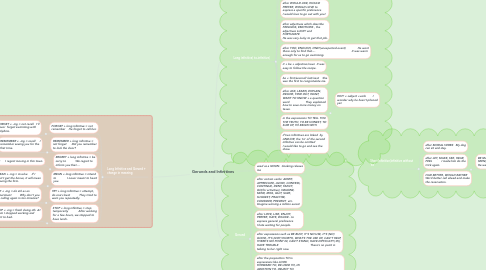Gerunds and Infinitives
by Monica Cotul


1. Long Infinitive and Gerund + change in meaning
1.1. FORGET + long infinitive = not remember He forgot to call her.
1.1.1. FORGET + -ing = not recall I'll never forget swimming with dolphins.
1.2. REMEMBER + long infinitive = not forget Did you remember to lock the door?
1.2.1. REMEMBER + -ing = recall I remember seeing you for the first time.
1.3. REGRET + long infinitive = be sorry to We regret to inform you that....
1.3.1. REGRET + -ing = feel sorry about I regret moving in this town.
1.4. MEAN + long infinitive = intend to I never meant to heart you.
1.4.1. MEAN + -ing = involve If I don't get the bonus, it will mean leaving the firm.
1.5. TRY + long infinitive = attempt, do one's best They tried to warn you repeatedly.
1.5.1. TRY + -ing = do sth as an experiment Why don't you try calling again in ten minutes?
1.6. STOP + long infinitive = stop temporarily After working for a few hours, we stopped to have lunch.
1.6.1. STOP + -ing = finish doing sth At 11pm I stopped working and went to bed.
2. Gerund
2.1. used as a NOUN: Cooking relaxes me
2.2. after certain verbs: ADMIT, APPRECIATE, AVOID, CONFESS, CONTINUE, DENY, FANCY, GO(for activities), IMAGINE, MIND, MISS, QUIT, SAVE, SUGGEST, PRACTISE, CONSIDER, PREVENT etc. Imagine winning a million euros!
2.3. after LOVE, LIKE, ENJOY, PREFER, HATE, DISLIKE - to express general preference I hate waiting for people.
2.4. after expressions such as BE BUSY, IT'S NO USE, IT'S (NO) GOOD, IT'S (NOT) WORTH, WHAT'S THE USE OF, CAN'T HELP, THERE'S NO POINT IN, CAN'T STAND, HAVE DIFFICULTY( IN), HAVE TROUBLE There's no point in talking to her right now.
2.5. after the preposition TO in expressions like LOOK FORWARD TO, BE USED TO, IN ADDITION TO, OBJECT TO, PREFER He prefers giving to receiving gifts.
2.6. after the verbs HEAR, LISTEN TO, NOTICE, SEE, WATCH, FEEL to describe an incomplete action I heard you speaking to her.(I only heard part of the conversation)
3. Long infinitive( to-infinitive)
3.1. used to express PURPOSE Dad has gone to buy the tickets.
3.2. after certain verbs AGREE, APPEAR, DECIDE, EXPECT, HOPE, PLAN, PROMISE, REFUSE She agreed to be present in court.
3.3. after WOULD LIKE, WOULD PREFER, WOULD LOVE to express a specific preference I would love to go out with you!
3.4. after adjectives which describe FEELINGS, EMOTIONS , the adjectives LUCKY and FORTUNATE He was very lucky to get that job.
3.5. after TOO, ENOUGH, ONLY(unexpected event) He went there only to find that.... It was warm enough for us to go swimming.
3.6. it + be + adjective/noun It was easy to follow the recipe.
3.7. be + first/second/ last/next She was the first to congratulate me.
3.8. after ASK, LEARN, EXPLAIN, DECIDE, FIND OUT, WANT, WANT TO KNOW + a question word They explained how to save more money on taxes.
3.8.1. WHY + subject +verb I wonder why he hasn't phoned yet.
3.9. in the expressions TO TELL YOU THE TRUTH, TO BE HONEST, TO SUM UP, TO BEGIN WITH
3.10. if two infinitives are linked by AND/OR, the 'to' of the second infinitive can be omitted I would like to go and see the show.
4. Short Infinitive(infinitive without 'to'
4.1. after MODAL VERBS My dog can sit and stay.
4.2. after LET, MAKE, SEE, HEAR, FEEL I made him do the trick again.
4.2.1. BE MADE, BE HEARD, BE SEEN(passive) + TO-INFINITIVE He was heard to say that.
